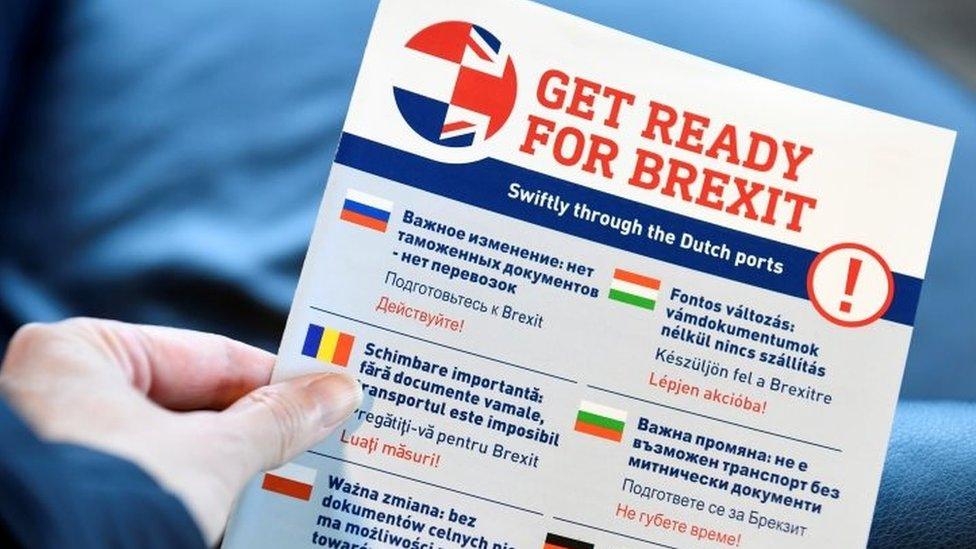What is a no-deal Brexit?
- Published

Dutch ports are preparing their customers for Brexit
MPs have rejected a no-deal Brexit, in a non-binding Commons vote. What does that mean?
This is not about whether Britain is leaving the European Union or not. It is written into law that the UK is leaving the EU on 29 March.
So why all the fuss about a deal?
The government has reached an agreement with the European Union that both sides say will keep Brexit disruption to a minimum.
If the UK leaves under the terms of that agreement, very little will change, in the short term at least.
A key part of the agreement is a 21 month "transition period", which kicks in the day the UK leaves.
Trade will carry on roughly as it does now and citizens will continue to be able to move freely between countries as if the UK was still a member of the EU.
The idea of the transition period is to allow the UK and EU to hammer out a permanent trading relationship - the prime minister has also agreed a statement on what that relationship might look like.
Why are so many MPs against the prime minister's deal?
They are worried about what will happen when the transition period comes to an end.
Instead of breaking free from the EU, they fear the UK will be permanently tied to its rules, with no say in how they are made.
That is because one section of the withdrawal agreement - known as the Irish backstop - would keep the UK part of a customs union with the EU, if no trade deal has been agreed.
The backstop is meant to prevent the return of physical checks at the border between Ireland and Northern Ireland, which will be the land border between the UK and the EU after Brexit.
What happens if there is a no-deal Brexit?
The UK would sever all ties with the EU with immediate effect, with no transition period - and, therefore, no talks on a tailor-made trade deal between the UK and the EU.
The UK would trade with the EU under World Trade Organisation rules, in the same way that it does with many non-EU countries.
Who is against a no-deal Brexit and why?
The government fears it would cause significant disruption to businesses in the short-term, with lengthy tailbacks of lorries at the channel ports, as drivers face new checks on their cargos.
Food retailers have warned of shortages of fresh produce and the NHS is stockpiling medicines, in case supplies from EU countries are interrupted.
Government ministers and multinational companies with factories in the UK have also warned about the long-term impact on the British economy.
Most MPs are thought to be against a no-deal Brexit for these reasons.
Who is in favour of a no-deal Brexit and why?
Many who campaigned for Brexit in the 2016 referendum believe the no-deal warnings have been exaggerated and that Britain will not only survive, but thrive, if it is allowed to make a totally clean break from the EU and what they see as its burdensome regulations.
They fear the UK will never be allowed to make trade deals with other countries if it ends up trapped in a customs union with the EU.
And the country would also save on the £39bn "divorce bill" it is set to pay to the EU under the terms of Mrs May's agreement.
Could Brexit be delayed?
The 29 March exit date could slip if MPs vote to ask for an extension from the European Union - something they could do in a vote planned for Thursday.
The EU may decide not to grant an extension unless the UK has a reason for it, such as deciding to hold another EU referendum, with the option of staying in the EU on the ballot paper.
And the UK government could cancel Brexit altogether if it wanted to. But as things currently stand, Brexit is definitely happening.
What about other Brexit deals?
Having been comprehensively rejected twice by MPs, many think the prime minister's deal is now dead.
MPs have been proposing different ideas for deals. Labour wants the UK to be in a customs union with the EU, and some Labour and Tory MPs want an even closer relationship, like the one Norway has with the EU.
There were no votes on these options on Wednesday.
MPs voted against proposals from a group of Conservative MPs for a "managed no-deal", which would see the transition period extended by a year until December 2021 to allow more time to agree a new trading relationship.
However, the prime minister has indicated that she will make a third attempt to get her EU withdrawal deal through Parliament in the coming days.
She has told MPs that if her deal fails again to get their backing, a lengthy delay to Brexit may be needed.